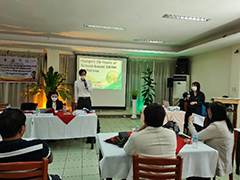JICA champions mainstreaming of disaster education in Philippine schools
2023.01.09
Cebu City - Climate change has increased the frequency and intensity of extreme weather events. The impact of disasters becomes even significantly greater upon vulnerable sectors, including schools and children, the Japan International Cooperation Agency (JICA) said.
Recognizing that disaster resilience can be also enhanced through capacity development, JICA and a Japanese non-profit organization (NPO) SEEDS Asia, in cooperation with the Department of Education (DepEd) Central Visayas shared lessons on disaster management in schools through a seminar in Cebu on 06 January 2023. Hyogo Prefectural Board of Education collaborates on this initiative as well.
The seminar was organized as part of JICA's Technical Cooperation on Grassroots Project (TCGP), which consists of three phases and has a history of about ten years. Said seminar summarized the findings and models developed from the second phase "Promotion of School Disaster Risk Reduction and Management in Cebu Province", as well as pronounced the kick-off of the third phase, "Strengthening and Promoting School-Based Disaster Risk Reduction in Central Visayas".
"Natural disasters do not only affect infrastructure, livelihood, and property. They also impact school children whose studies are disrupted when disaster happens. In Japan, disaster education including evacuation drills is widely practiced, and it is said that effective disaster education is key for mitigating the damage by natural disaster. That's why JICA conducts our joint work collaborating with Japan's NPO and others, and, through our further efforts with different stakeholders in the education sector in Central Visayas, JICA envisions to help the region be a disaster education model that can be rolled out in other regions," said JICA Senior Representative YANAGIUCHI Masanari. "The model indicates the importance of learning from past disasters for informed decision-making and training of teachers on disaster management," he added.
The World Risk Index 2022 showed that the Philippines ranked the worst among the 193 countries. Looking back, the unfamiliarity and unpreparedness of schools and children on natural hazards became evident when Typhoon Yolanda and the Bohol earthquake struck the region in 2013.
Currently, the likelihood of typhoons devastating the region is becoming increasingly high due to climate change. The project provides avenue for coordination among local residents and local school personnel in times of disasters.
The first phase of JICA cooperation developed training materials for teachers and instructional plans incorporating DRR Education for enhanced understanding of disaster risk among students. This was followed by the second phase that developed a school disaster preparedness manual and disaster response manual for the ten pilot schools identified in Cebu, to facilitate the implementation of the School Disaster Risk Reduction and Management.

Mr. Takeshi Hatanaka, Education Supervisor of Hyogo Board of Education presenting about School-based DRRM initiatives.
These outcomes are also disseminated within and even outside Central Visayas, by the trained personnel as direct beneficiaries of the previous phases.
The TCGP is a grassroots-level initiative supporting human resource development in JICA partner countries, such as the Philippines, through sharing of knowledge and experiences of Japanese NPOs, local governments, universities, and public corporations.

Distinguished speakers and participants during the seminar to mainstream disaster education in Cebu.
scroll